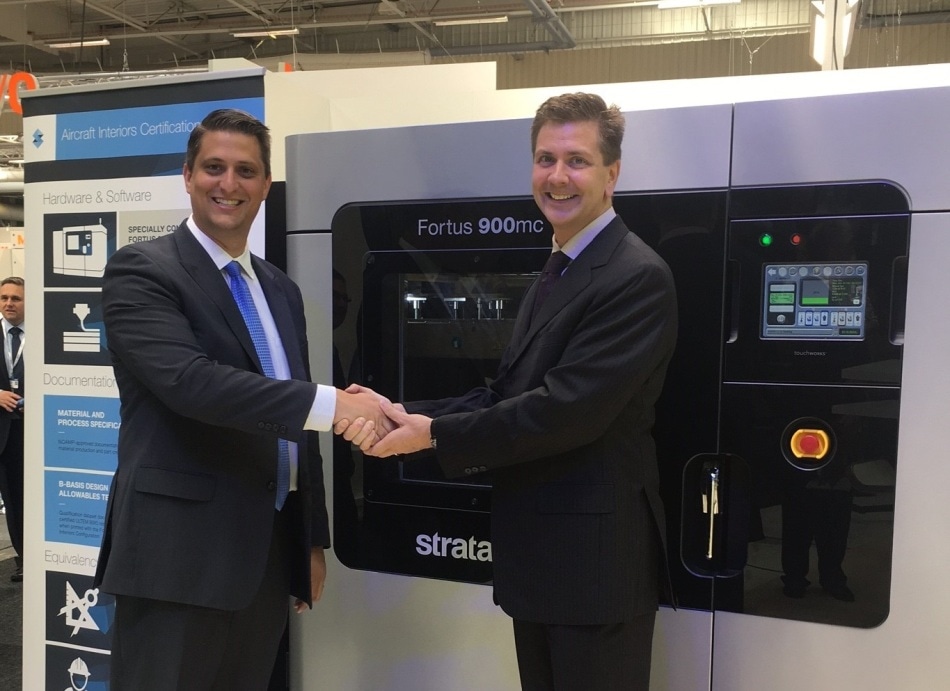Jul 12 2017
Recently, Stratasys, the 3D printing and additive manufacturing solutions company, announced that its newly-launched Fortus 900mc Aircraft Interiors (AI) Certification Solution has been adopted by one of the top parts supplier Western Tool & Mold to manufacture aircraft cabin components that meet rigorous FAA and EASA certification requirements.
 Scott Sevcik, Head of Aerospace, Defense and Automotive Solutions, Stratasys (on left) congratulates Collin Wilkerson, Managing Director, Western Tool & Mold on his company's purchase of the Stratasys Fortus 900mc Aircraft Interiors Certification Solution (Photo: Business Wire)
Scott Sevcik, Head of Aerospace, Defense and Automotive Solutions, Stratasys (on left) congratulates Collin Wilkerson, Managing Director, Western Tool & Mold on his company's purchase of the Stratasys Fortus 900mc Aircraft Interiors Certification Solution (Photo: Business Wire)
Hong Kong-based Western Tool & Mold (WTM) caters to the aerospace interiors market where airlines seek quick turnaround of replacement parts to enhance supply chain efficiency, but are frequently challenged due to the unique geometries of different components.
Adding the Stratasys Fortus 900mc Aircraft Interiors Certification edition to our extensive arsenal of Stratasys FDM and PolyJet-based 3D Printing Solutions not only gives us the opportunity to provide repeatable, certified aircraft parts to tier 1 and tier 2 aircraft parts suppliers but also the accompanying documentation process is now automated – making it easier to meet evolving industry quality standards while freeing up more time to invest in production. The Stratasys Aircraft Interiors Certification Solution will allow us to work with our customers early in their design and development process and help be more agile than our competition in responding to customer requests.
Collin Wilkerson, Managing Director, Western Tool & Mold
The Fortus 900mc Aircraft Interiors Certification Solution comprises of ULTEM™ 9085 resin, which is a robust, lightweight thermoplastic that complies with aerospace flame, smoke and toxicity (FST) regulations (FAR 25.863), and a new edition of the Fortus 900mc Production 3D Printer with specialized hardware and software engineered to deliver highly repeatable mechanical properties.
Western Tool & Mold is currently using the Stratasys technology to 3D print aircraft cabin parts with complex geometries and low quantity demand such as lavatory components and first-class overhead bin lockers. By 3D printing these parts straight from CAD designs, bypassing metal manufacturing processes, WTM’s customers can test parts sooner in the design process and save huge sums of money in manufacturing expenses.
We are gratified that one of our long standing customers, Western Tool & Mold, will be using the Fortus 900mc Aircraft Interiors Certification Solution to improve supply chain efficiency for Asia’s aviation industry. This solution minimizes the obstacles that have impeded the wider adoption of 3D printing for aircraft cabin parts - addressing the key issues of repeatability, certification and documentation. In addition to providing lightweight, durable parts according to stringent specifications, Stratasys 3D printing enables these parts to be customized according to the airlines’ brand design – affording new opportunities to reinforce corporate messaging inflight.
Omer Krieger, President, Stratasys Asia Pacific and Japan
Western Tool & Mold Adopts Stratasys’ new Certified 3D Printing Solution for Aircraft Interiors.
Video: Watch how Western Tool & Mold accelerates certified parts production to gain competitive advantage in aerospace supply chains.